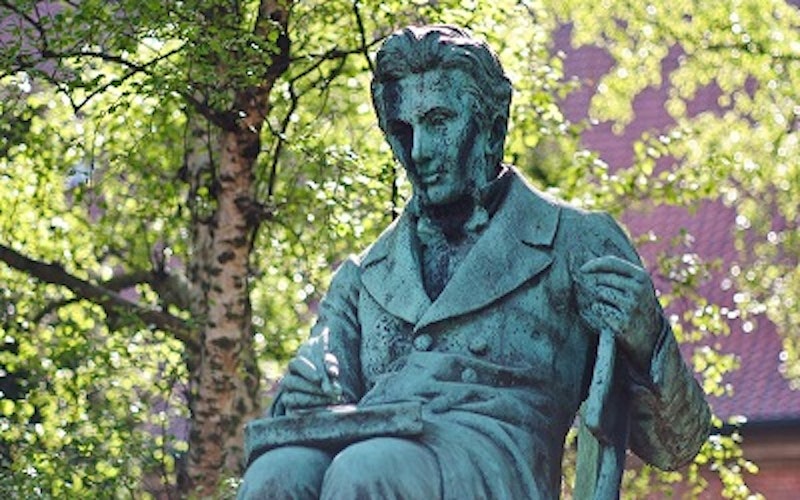
Culture At Large
A challenge from Kierkegaard on his 200th birthday
“The highest and most beautiful things in life are not to be heard about, nor read about, nor seen but, if one will, are to be lived.” (Søren Kierkegaard, Either/Or)
May 5 marks the 200th birthday of Danish writer Søren Aabye Kierkegaard, a philosopher, theologian, poet and cultural critic. It seems especially appropriate to mark this anniversary at Think Christian. Kierkegaard would have liked TC. Well, perhaps “liked” is too strong a word to use in connection with such a famously cantankerous person, who so thrived on controversy that he arranged to have himself publicly ridiculed in a prominent Copenhagen magazine.
But I think Kierkegaard would have understood and appreciated a cultural project such as this. He dedicated his life to vivid writing about the intellectual and religious issues of his time, urging his readers to live authentic, engaged Christian lives rather than settling for what he saw as the compromised status quo dominating Copenhagen’s cultural elite and, through it, the whole Danish national church. Kierkegaard would have stridently agreed that there is “no such thing as secular.”
What have you read today that has offered to form you, to change your course of action, to make you aware of standing before the face of God in all your cultural doing and experiencing?
On the other hand, Kierkegaard would probably have had concerns about what could go very wrong for those engaged in culture in this way. He had deep misgivings about the modern culture of intellectual reflection. He found that culture to be at once too slack and too rigid: too slack in its fondness for recreationally bandying about ideas but never taking the risk of putting them into action; too rigid in its desire for rationally justified formulas of once-for-all, objective explanation. Both, for Kierkegaard, were symptoms of the tendency to use thinking as a retreat from the rigorous demands of living, of actually being formed into what he called “that individual,” a person who responds to the unique circumstances of one’s life as a particular call from God. His caustic denouncements in his essay “The Present Age” of what he called “the abstract leveling process, that self-combustion of the human race” are all the more stinging when read with an eye on the casual opinion-mongering of our contemporary blog culture.
And yet, rather than giving up on intellectual life altogether, Kierkegaard worked to leapfrog past the shallow intellectualizing he observed around him. He practiced forms of thinking and writing that explored concrete, existential concerns of life and invited his readers to enter into that exploration. He relentlessly probed what it would be like to lead various kinds of lives, what the possibilities for redemption would be within those lives, often even to the point of assuming a fictitious authorial persona (he used several pseudonyms). Whether contrasting the fictitious diaries of an unnamed seducer and Judge Wilhelm in Either/Or, meditating over and over again on the terror of God’s demand that Abraham sacrifice his son Isaac in Fear and Tremblingor even in the many Upbuilding Discourses that he published under his own name, Kierkegaard resolutely preferred unresolved paradox to rationalizing explanation. Where explanation would offer the reader a solution, paradox demands that the reader make a decision, a committed response.
And so wherever you clicked from to get here, in honor of Kierkegaard’s birthday I ask you: what have you read today, on this site or anywhere else, that has offered to form you, to change your course of action, to make you aware (whether in joy or in dread) of standing before the face of God in all your cultural doing and experiencing? And what are you going to do about it?
Topics: Culture At Large, Science & Technology, Philosophy